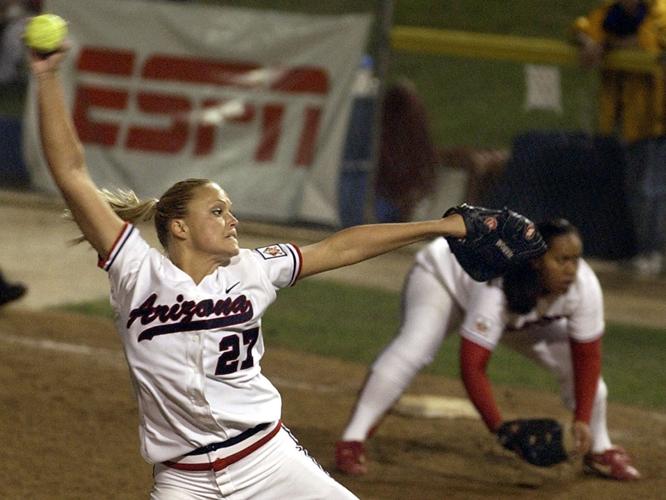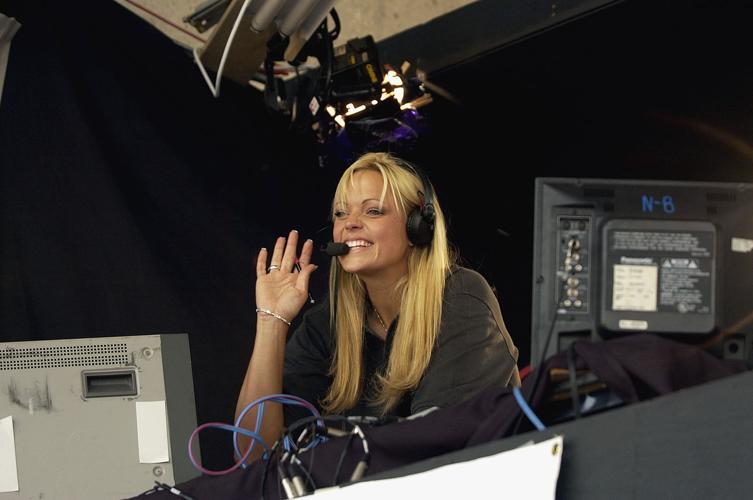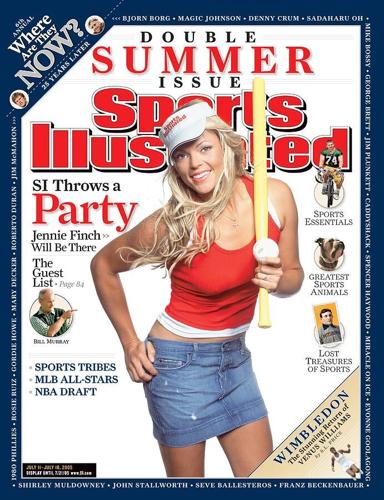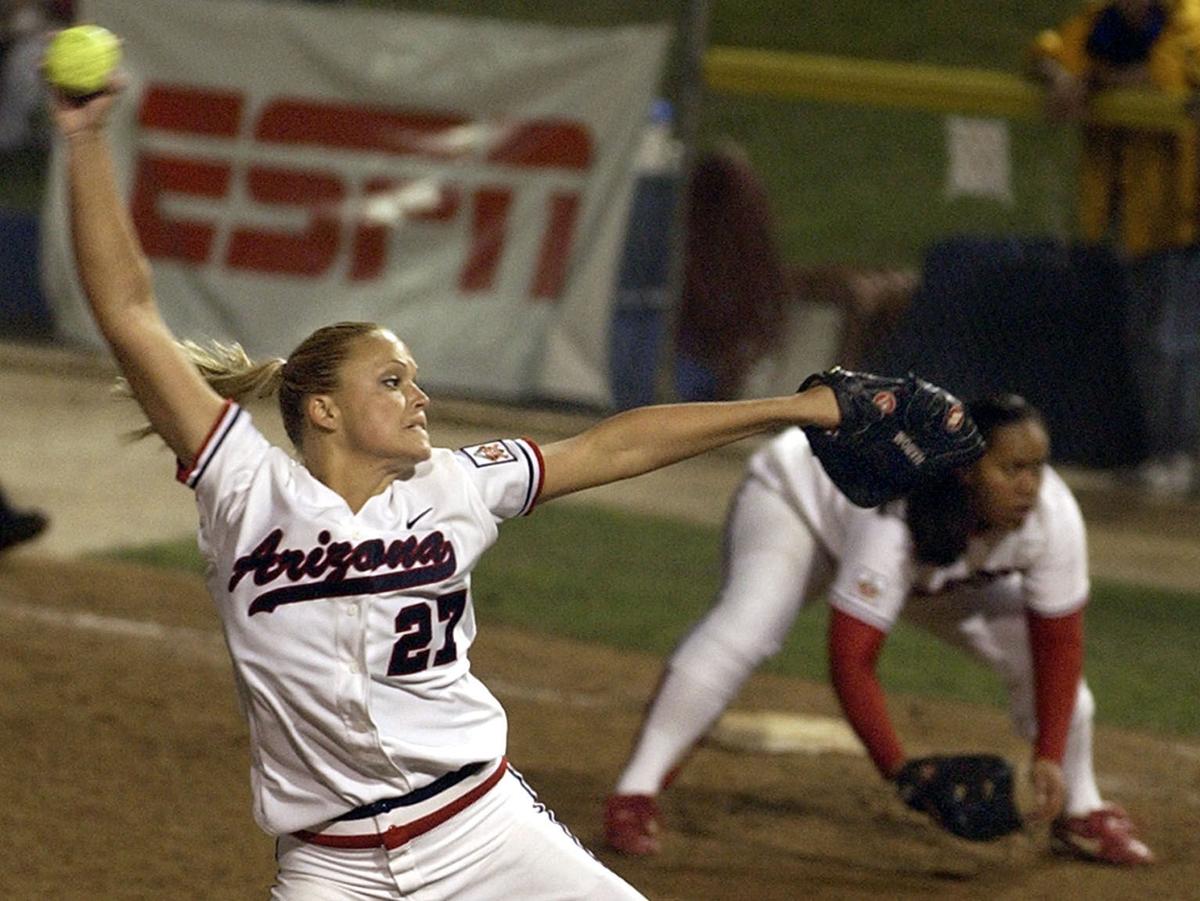Sports Illustrated’s comprehensive report on the Athens Olympics arrived at newsstands and in mail boxes in late August 2004 with a cover headline that said:
The real dream team
Five Tucson athletes were pictured on SI’s cover: UA softball players Jennie Finch, Lovie Jung and Leah O’Brien Amico, Salpointe Catholic’s Tairia Mims and UA swimmer Amanda Beard.
The gold medal issue was a reflection on the golden era of UA sports. It was Finch who became the Golden Girl.
A year later, Finch was featured in the magazine’s annual swimsuit issue, followed that summer by a third appearance in Sports Illustrated, this time holding a bat and ball under the cover headline “SI Throws a Party.”

Jennie Finch
Her softball career, her life, had become an American sports celebration.
By the time Finch was featured in Sports Illustrated eight years later — “Jennie Finch Turns 33,” it said — she had been a headliner in Glamour, on the “Late Show” with David Letterman and a co-host of the ESPYs. Among many others, Finch represented Timex, Bank of America, Mizuno and Rolex, and was hired as America’s Youth Softball Ambassador for Major League Baseball.
And, oh, yes, she also struck out MLB home run king Barry Bonds in a made-for-TV program.

Finch, who is No. 16 on our list of Tucson’s Top 100 Sports Figures of the last 100 years, played her last softball game for Mike Candrea’s Wildcats in June 2002. Although most have forgotten, Finch lost that game 6-0 to Cal, a showdown at the national championship game in which the Wildcats couldn’t score off of Finch’s high school rival, Jocelyn Forest of SoCal’s Righetti High School.
Jocelyn Forest?
In both 1997 and 1998, the Los Angeles Times selected Forest, not Finch, as Southern California’s Division II Player of the Year.
But after Finch, a former UCLA bat girl, signed with Arizona over the Bruins and Washington, it is difficult to remember a time she didn’t win. And win. And win.
In 2000 and 2001, Finch won an NCAA record 60 consecutive games, including a historic 32-0 run to the 2001 national championship. It was a period so flush with success that the Wildcats won 70 straight games at Hillenbrand Stadium.
Finch was probably the most well-known athlete in Tucson at that time, surpassing Lute Olson’s Final Four stars such as Gilbert Arenas and Richard Jefferson. Finch’s four-year Arizona career was incandescent; she went 119-16 and also hit .301 with 50 home runs.
When Team USA rolled through the 2004 Athens Olympics, allowing just one run — a team so deep in talent that Finch was required to pitch just eight innings, allowing one hit and striking out 13 — she went global.

Pitcher Jennie Finch, center, and fellow players carry coach Mike Candrea as they celebrate their gold medal win over Australia at the 2004 Olympic Games in Athens.
Gold medal shortstop Natasha Watley jokingly told Olympic reporters that the only time she was interviewed was to be asked about Finch.
“You go anywhere and you can say ‘Jennie Finch’ and people know who it is,” Watley told reporters. “You say you play softball, and people say, ‘Do you know Jennie Finch?’”
Candrea recruited Finch off the Orange County Batbusters travel team, an organization that regularly stocked Arizona with difference-making players such as Toni Mascarenas and Lauren Bauer.
“She was definitely a first priority in recruiting,” Candrea said upon announcing Finch had signed to play for the Wildcats in November 1997. “We felt she could come in and make an impact.”

The Wildcats retired Jennie Finch's No. 27 jersey in 2003.
Finch’s 60-game winning streak was stopped by No. 1 UCLA on April 7, 2002, at Hillenbrand Stadium before a record crowd of 3,161. That loss got the lead headline in the Star, more prominent than UA sophomore golfer Lorena Ochoa’s seventh consecutive tournament championship, an NCAA record.
Finch was the story, win or lose.
During that 2002 season, Casey Daigle, a young pitcher working his way through spring training with the Arizona Diamondbacks at Tucson Electric Park, introduced himself to Finch after a game at Hillenbrand Stadium. He later proposed to her on the pitching mound. It was probably the best pitch Finch had ever seen.
Daigle and Finch were married in 2005; they live in Daigle’s hometown near Sulphur, Louisiana, on an 80-acre ranch. They have three children: Ace, 15, Diesel, 10, and Paisley, 8.

Jennie Finch served as a color analyst for the 2003 Women's College World Series in Oklahoma City.
Daigle reached the major leagues in 2004, pitching briefly for the Diamondbacks, and spent the bulk of his pro career pitching for the Tucson Sidewinders. He retired from sports in 2011, as did Jennie.
Over the last 10 years, Finch has worked at hundreds of clinics for the Jennie Finch Softball Camps organization, making public appearances in virtually every state in America.
Photos: Arizona legend Jennie Finch through the years
Jennie Finch through the years
Updated
Pitcher Jennie Finch walks back to first base after conferring with Becky Lemke, who pitched the first game of the double-header against the Washington Huskies, May 8, 1999. Finch pitched the second game. Photo by Sarah Prall / Arizona Daily Star
Jennie Finch through the years
Updated
UA softball player Jennie Finch (27), Jan. 31, 1999. Photo by David Sanders / Arizona Daily Star
Jennie Finch through the years
Updated
Arizona softball players Becky Lemke, left, and Jennie Finch, Feb. 17, 2000. Photo by Benjie Sanders / Arizona Daily Star
Jennie Finch through the years
Updated
UA pitcher Jennie Finch pitches against UMass, May 19, 2000. Photo by Aaron J. Latham / Arizona Daily Star
Jennie Finch through the years
Updated
UA pitchers Becky Lemke, left, and Jennie Finch wipe tears away as they stand next to each other as the team gets their trophies, May 28, 2000. Photo by Benjie Sanders / Arizona Daily Star
Jennie Finch through the years
Updated
UA softball pitcher Jennie Finch fires the ball during the Wildcats' victory over the Nebraska Cornhuskers, May 21, 2000. Photo by Joshua Trujillo / Arizona Daily Star
Jennie Finch through the years
Updated
UA pitcher Jennie Finch gets a pep talk from catcher Lindsey Collins (42) during Finch's no-hitter against Nebraska. The Wildcats pummeled the Cornhuskers during the NCAA championship game held at Hillenbrand Stadium, May 21, 2000. Photo by Joshua Trujillo / Arizona Daily Star
Jennie Finch through the years
Updated
University of Arizona's Jennie Finch is bombarded with hugs from (clockwise from bottom left) Helene Brown, Mallory Kimble, Katja Rundel and Sophia Atchison at The Beginning School where Finch visited on Monday, Oct. 29, 2001, in Tucson, Ariz. Photo by Renee Sauer / Arizona Daily Star
Jennie Finch through the years
Updated
Arizona's Jennie Finch watches to see if she hit a home run during a game in which the Wildcats beat the Saint Peter's College Peahens from Jersey City, New Jersey, 4-2 at Hillenbrand Memorial Stadium during the NCAA Division I Softball Championship, May 17, 2001. Photo by Max Becherer / Arizona Daily Star
Jennie Finch through the years
Updated
UA pitcher Jennie Finch winds up for the pitch against Cal, April 22, 2001. The Wildcats played a double-header against the Bears, winning both games at Hillenbrand Stadium. Photo by Jeffry Scott / Arizona Daily Star
Jennie Finch through the years
Updated
UA softball players congratulate pitcher Jennie Finch (27) after the second inning against University of Louisiana-Lafayette, March 24, 2002. Photo by David Sanders / Arizona Daily Star
Jennie Finch through the years
Updated
UA's Jennie Finch runs toward first base in their game against Louisville, Feb. 15, 2002. Photo by David Sanders / Arizona Daily Star
Jennie Finch through the years
Updated
Arizona pitcher Jennie Finch (27) celebrates with third baseman Jackie Coburn (77) and catcher Mackenzie Vandergeest Saturday, May 25, 2002, in a continuation of a second-round game in the Women's College World Series in Oklahoma City. Finch threw a one-hit, eight-inning shutout, striking out nine. Arizona won the game in extra innings, 1-0, and advanced to Sunday's semifinal round. (AP Photo/Jerry Laizure)
Jennie Finch through the years
Updated
UA pitcher Jennie Finch in the fourth inning against Alabama, Feb. 1, 2002. Photo by David Sanders / Arizona Daily Star
Jennie Finch through the years
Updated
UA's pitcher Jennie Finch throws to first base for an out in the first inning against Alabama, Feb. 1, 2002. Photo by David Sanders / Arizona Daily Star
Jennie Finch through the years
Updated
University of Arizona's Jennie Finch high-fives her teammates as she arrives at home after hitting a grand slam in the bottom of the third inning against Alabama on Saturday, Feb. 2, 2002. Photo by A.E. Araiza / Arizona Daily Star
Jennie Finch through the years
Updated
Members of the UA softball team from left to right, Courtney Fossatti (22), Jennie Finch (27) and Leneah Manuma (9) show their excitement as they watch Lovieanne Jung (3) make her way around the bases after her game-winning hit in the last inning of their game against UCLA. UA beat UCLA with this hit 3-2 at Hillenbrand Stadium on Saturday, April 6, 2002. Photo by Max Becherer / Arizona Daily Star
Jennie Finch through the years
Updated
Arizona's Jennie Finch talks to her teammates after losing against UCLA at Hillenbrand Stadium, Sunday, April 7, 2002. Photo By Ian Wingfield / Arizona Daily Star
Jennie Finch through the years
Updated
Arizona's Jennie Finch pitches during the 5th inning against the UCLA Bruins at Hillenbrand Stadium, Sunday, April 7, 2002. UCLA won 6-5. Photo By Ian Wingfield / Arizona Daily Star
Jennie Finch through the years
Updated
Arizona's Jennie Finch pitches during the 5th inning against the UCLA Bruins at Hillenbrand Stadium, Sunday, April 7, 2002. UCLA won 6-5. Photo By Ian Wingfield / Arizona Daily Star
Jennie Finch through the years
Updated
Arizona's Jennie Finch pitches during the 5th inning against the UCLA Bruins at Hillenbrand Stadium, Sunday, April 7, 2002. UCLA won 6-5. Photo By Ian Wingfield / Arizona Daily Star
Jennie Finch through the years
Updated
UA pitcher Jennie Finch pitches in the first game against Nebraska, May 23, 2002. Photo by Benjie Sanders / Arizona Daily Star
Jennie Finch through the years
Updated
UA pitcher Jennie Finch pitches in the first game against Nebraska, May 23, 2002. Photo by Benjie Sanders / Arizona Daily Star
Jennie Finch through the years
Updated
Arizona softball pitcher Jennie Finch, center, poses for a picture with Arizona Diamondbacks pitchers Curt Schilling, left, and Randy Johnson, right, before the Diamondbacks exhibition game with the Oakland Athletics in Tucson, Ariz., on Thursday, March 7, 2002. Finch has won 53 consecutive games at Arizona, a collegiate record. (AP Photo/Ed Andrieski)
Jennie Finch through the years
Updated
UA's Jennie Finch against Northridge, Feb. 24, 2002. Photo by David Sanders / Arizona Daily Star
Jennie Finch through the years
Updated
Arizona's Jennie Finch, second from left, smiles with her teammates before their game against Northridge on Feb. 24, 2002.
Jennie Finch through the years
Updated
UA pitcher Jennie Finch winds up Sunday, May 26, 2002 on her way to striking out 17 Seminoles and advancing the Cats to the Championship game against Cal, May 27, 2002. Photo by Jim Davis / Arizona Daily Star
Jennie Finch through the years
Updated
Arizona pitcher Jennie Finch throws against Cal in the championship game Monday, May 27, 2002. Photo by Jim Davis / Arizona Daily Star
Jennie Finch through the years
Updated
Arizona coach Mike Candrea takes Jennie Finch out of the game in the top of the 7th inning, May 27, 2002. Photo by Jim Davis / Arizona Daily Star
Jennie Finch through the years
Updated
Arizona head coach Mike Candrea gives Jennie Finch a hug after the UA loss to Cal in the championship game Monday, May 27, 2002. Photo by Jim Davis / Arizona Daily Star
Jennie Finch through the years
Updated
UA's Jennie Finch threw a no-hit, no-run game against Central Arizona College in the first softball game of a double-header, Jan. 29, 2002. The UA won 8-0 and ended early due to the 8-run rule. Photo by Benjie Sanders / Arizona Daily Star
Jennie Finch through the years
Updated
Arizona softball players Jennie Finch, left, and Leneah Manuma share a laugh while the team signs autographs after the Cats game against Oregon State, April 29, 2002. Photo by Chris Richards / Arizona Daily Star
Jennie Finch through the years
Updated
President Bush gets a University of Arizona jersey from softball player Jennie Finch, left, in the East Room at the White House, Tuesday, March 12, 2002, in Washington during an event with NCAA champions. (AP Photo/Kenneth Lambert)
Jennie Finch through the years
Updated
Jennie Finch stands next to her jersey at Hillenbrand Stadium where the ceremony was held in order to retire Finch's jersey, Friday, May 9, 2003 in Tucson, Ariz. Photo by Rich-Joseph Facun / Arizona Daily Star
Jennie Finch through the years
Updated
Former UA star Jennie Finch wipes a tear as her No. 27 is retired before a game on May 10, 2003. Photo by Tricia McInroy / Tucson Citizen
Jennie Finch through the years
Updated
Jennie Finch, U.S. softball pitcher, works in the second inning against Canada during a Pan American Games preliminary round match Wednesday, Aug. 6, 2003 in Santo Domingo, Dominican Republic. (AP Photo/Roberto Candia)
Jennie Finch through the years
Updated
Jennie Finch is the color analyst for the NCAA women's softball tourney going on in Oklahoma City, Oklahoma. She is in the booth waving at fans hollering at her from the stands before going on the air, May 24, 2003. Photo by Benjie Sanders / Arizona Daily Star
Jennie Finch through the years
Updated
Jennie Finch is the color analyst for the NCAA women's softball tourney going on in Oklahoma City, Oklahoma. She is in the booth waving at fans hollering at her from the stands before going on the air, May 24, 2003. Photo by Benjie Sanders / Arizona Daily Star
Jennie Finch through the years
Updated
U.S. softball player Jennie Finch talks to team coach Mike Candrea during a practice session at the Olympic Softball Stadium at Helliniko, Athens, Aug. 13, 2004. (REUTERS/Mike Finn-Kelcey)
Jennie Finch through the years
Updated
U.S. softball player Jennie Finch listens to a question at a press conference in Athens, Aug. 10, 2004. (REUTERS/Mike Finn-Kelcey)
Jennie Finch through the years
Updated
Team USA hurler Jennie Finch fires a pitch during an exhibition game against Arizona, March 27, 2004. Photo by Renee Bracamonte / Tucson Citizen
Jennie Finch through the years
Updated
United States pitcher Jennie Finch winds up during women's softball action against Canada at the Summer Olympics in Athens Wednesday, Aug. 18, 2004. The U.S. won the game 7-0. (AP Photo/Ryan Remiorz)
Jennie Finch through the years
Updated
Olympic softball gold medal winner Jennie Finch, left, lets former Negro Leaguer Buck O'Neal wear her gold medal during a tour of the Negro Leagues museum in Kansas City, Mo., on Wednesday, Nov. 17, 2004. (AP Photo/The Kansas City Star, John Sleezer)
Jennie Finch through the years
Updated
U.S.A.'s Caitlin Lowe, left, Jennie Finch, center, and Jamie Southern watch from the dugout in the seventh inning as Japan beat the U.S. 3-1 in the championship game of the World Cup of Softball in Oklahoma City, Monday, July 18, 2005. (AP Photo/Sue Ogrocki)
Jennie Finch through the years
Updated
Danny Anguiz, left, seems to be dumbfounded while being in the presence of former UA softball pitcher and Olympian Jennie Finch during a pro-am event at Randolph North to help raise money on March 12, 2005. Photo by David Sanders / Arizona Daily Star
Jennie Finch through the years
Updated
Former UA softball player and Olympic gold medal winner Jennie Finch pitches against the Arizona Heat at Hi Corbett Field, Thursday, June 23, 2005. Photo by David Sanders / Arizona Daily Star
Jennie Finch through the years
Updated
Former UA softball player and Olympic gold medal winner Jennie Finch stands with her Chicago Bandits during the first inning against the Arizona Heat at Hi Corbett Field, Thursday, June 23, 2005. Photo by David Sanders / Arizona Daily Star
Jennie Finch through the years
Updated
Former UA softball player and Olympic gold medal winner Jennie Finch, left, says a quick hello to a long-time friend as she brings her an Olympic article just before their game against the Arizona Heat at Hi Corbett Field, Thursday, June 23, 2005. Photo by David Sanders / Arizona Daily Star
Jennie Finch through the years
Updated
Former UA softball player and Olympic gold medal winner Jennie Finch waves to fans from the dugout at Hi Corbett Field, Thursday, June 23, 2005. Photo by David Sanders / Arizona Daily Star
Jennie Finch through the years
Updated
Former UA softball player and Olympic gold medal winner Jennie Finch takes batting practice prior to her game against the Arizona Heat at Hi Corbett Field, Thursday, June 23, 2005. Photo by David Sanders / Arizona Daily Star
Jennie Finch through the years
Updated
Former UA softball player and Olympic gold medal winner Jennie Finch goofs around with players across the field during batting practice prior to their game against the Arizona Heat at Hi Corbett Field, Thursday, June 23, 2005. Photo by David Sanders / Arizona Daily Star
Jennie Finch through the years
Updated
Billy Bob Thorton is seen in the background as Jennie Finch and Jon Lovitz look at a photo they had taken of each other at the 2005 All Star Futures Game and Legends and Celebrities Game on Sunday, July 10, 2005. (AP Photo/Detroit Free Press, Mandi Wright)
Jennie Finch through the years
Updated
Team USA softball pitcher Jennie Finch warms up before the team's game against the Arizona Heat at Hi Corbett Field on June 30, 2006. Photo by Will Seberger / Special to the Arizona Daily Star
Jennie Finch through the years
Updated
Team USA softball pitcher Jennie Finch warms up before the team's game against the Arizona Heat at Hi Corbett Field on June 30, 2006. Photo by Will Seberger / Special to the Arizona Daily Star
Jennie Finch through the years
Updated
Team USA softball pitcher Jennie Finch jokes with coach Mike Candrea in the dugout during the team's game against the Arizona Heat at Hi Corbett Field on June 30, 2006. Photo by Will Seberger / Special to the Arizona Daily Star
Jennie Finch through the years
Updated
Team USA softball pitcher Jennie Finch watches her team's game against the Arizona Heat at Hi Corbett Field on June 30, 2006. Photo by Will Seberger / Special to the Arizona Daily Star
Jennie Finch through the years
Updated
Team USA softball pitcher Jennie Finch warms up before the team's game against the Arizona Heat at Hi Corbett Field on June 30, 2006. Photo by Will Seberger / Special to the Arizona Daily Star
Jennie Finch through the years
Updated
USA's starting pitcher Jennie Finch throws against Venezuela during their women's softball preliminary game at the Beijing 2008 Olympics in Beijing, Tuesday, Aug. 12, 2008. (AP Photo/Elaine Thompson)
Jennie Finch through the years
Updated
Jennie Finch pitches for the U.S.A. Olympic Team during the game against the University of Arizona at Hillenbrand Stadium, Feb. 19, 2008. Photo by Jill Torrance / Arizona Daily Star
Jennie Finch through the years
Updated
Jennie Finch pitcher for the U.S.A. Olympic Team connects with the ball during the game against the University of Arizona at Hillenbrand Stadium, Feb. 19, 2008. Photo by Jill Torrance / Arizona Daily Star
Jennie Finch through the years
Updated
Jennie Finch of the United States closes out a 9-0 victory over China on Monday, Aug. 18, 2008, in the games of the XXIX Olympiad in Beijing, China. (David Eulitt/Kansas City Star/MCT)
Jennie Finch through the years
Updated
Members of the United States women's softball team watch during the medal ceremony after losing to Japan in the gold medal game in the 2008 Beijing Olympics in Beijing, Thursday, Aug. 21, 2008. From left to right are: Jennie Finch, Caitlin Lowe, Victoria Galindo, Monica Abbott, and Kelly Kretschman. (AP Photo/Elaine Thompson)
Jennie Finch through the years
Updated
President Bush poses for photos with the U.S. women's softball team, including Jennie Finch, back row right, as he greets members of the U.S. Olympic team prior to the opening ceremony for the 2008 Olympics in Beijing, Friday, Aug. 8, 2008. (AP Photo/Gerald Herbert)
Jennie Finch through the years
Updated
U.S. softball pitcher Jennie Finch throws in practice Sunday, Aug. 10, 2008, at the Beijing 2008 Olympics in Beijing. (AP Photo/Elaine Thompson)
Jennie Finch through the years
Updated
USA players wave to fans after beating China in their women's softball preliminary game at the Beijing 2008 Olympics in Beijing, Monday, Aug. 18, 2008. They are, from left, Andrea Duran, Jennie Finch, Jessica Mendoza, Monica Abbott and Kelly Kretschman. (AP Photo/Elaine Thompson)
Jennie Finch through the years
Updated
The United States' Jennie Finch plays at first base against Italy in a World Cup of Softball game in Oklahoma City, Friday, July 17, 2009. (AP Photo)
Jennie Finch through the years
Updated
U.S. pitcher Jennie Finch reacts as the United States defeats the Netherlands 7-2 in a World Cup of Softball game in Oklahoma City, Thursday, July 16, 2009. (AP Photo)
Jennie Finch through the years
Updated
FILE - This July 20, 2009, file photo shows United States' Jennie Finch, left, holding her individual plaque and her son, Ace, following the World Cup of Softball championship game in Oklahoma City. The U.S. defeated Australia 3-1. (AP Photo/File)
Jennie Finch through the years
Updated
FILE - This July 19, 2009, file photo shows United States' Jennie Finch pitching against Australia in the fourth inning of a World Cup of Softball game in Oklahoma City. (AP Photo/Nati Harnik, File)
Jennie Finch through the years
Updated
Olympic gold medalist Jennie Finch gives a thumbs-up to her team during the first inning against Canada in a World Cup of Softball game in Oklahoma City, Thursday, July 22, 2010. USA won 9-0 in six innings. (AP Photo/Alonzo Adams)
Jennie Finch through the years
Updated
USA player and Olympic gold medalist Jennie Finch, right, celebrates with her coach while running home after a home run against Canada in the first inning of a World Cup of Softball game in Oklahoma City, Thursday, July 22, 2010. (AP Photo/Alonzo Adams)
Jennie Finch through the years
Updated
USA Team member and Olympic gold medalist Jennie Finch warms up before a game against Japan in a World Cup of Softball game in Oklahoma City, Saturday, July 24, 2010. (AP Photo/Alonzo Adams)
Jennie Finch through the years
Updated
US starter Jennie Finch pitches to the Dominican Republic at a Women's Softball World Championship game in Caracas, Monday, June 28, 2010. US won 10-1. (AP Photo/Leonardo Ramirez)
Jennie Finch through the years
Updated
Former Wildcat Jennie Finch addresses the crowd at Hillenbrand Stadium in between innings during an all-star game between the National Pro Fastpitch All-Stars team and the Wildcat softball team, Monday, Oct. 4, 2010. The all-star team won 9-0. Photo by Mamta Popat / Arizona Daily Star
Jennie Finch through the years
Updated
Former Wildcat Jennie Finch catches the ball for an easy out in the fourth inning during an all-star game between the National Pro Fastpitch All-Stars team and the Wildcat softball team, Monday, Oct. 4, 2010. The all-star team won 9-0. Photo by Mamta Popat / Arizona Daily Star
Jennie Finch through the years
Updated
Jennie Finch, right, chats with Vicky Galindo before heading up to bat in the first inning during a game between the National Pro Fastpitch All-Stars team and the Wildcat softball team, Monday, Oct. 4, 2010. The all-star team won 9-0. Photo by Mamta Popat / Arizona Daily Star
Jennie Finch through the years
Updated
Former Olympic softball player Jennie Finch throws out a ceremonial first pitch before the Colorado Rockies played the San Francisco Giants in a baseball game in San Francisco, Wednesday, June 2, 2010. (AP Photo/Jeff Chiu)
Jennie Finch through the years
Updated
United States' Jennie Finch bats against Japan in the first inning during the World Cup of Softball championship game in Oklahoma City, Monday, July 26, 2010. (AP Photo/Alonzo Adams)
Jennie Finch through the years
Updated
Softball player Jennie Finch follows through as catcher Michael Clarke Duncan watches during the All-Star Legends & Celebrity softball game, Sunday, July 11, 2010, in Anaheim, Calif. (AP Photo/Jae C. Hong)
Jennie Finch through the years
Updated
Jennie Finch arrives at the ESPY Awards on Wednesday, July 14, 2010 in Los Angeles. (AP Photo/Dan Steinberg)
Jennie Finch through the years
Updated
Jennie Finch, right, and Casey Daigle arrive at the ESPY Awards on Wednesday, July 14, 2010 in Los Angeles. (AP Photo/Dan Steinberg)
Jennie Finch through the years
Updated
FILE - This July 11, 2010, file photo shows softball player Jennie Finch reacting after hitting a home run during the All-Star Legends & Celebrity softball game, in Anaheim, Calif. (AP Photo/Mark J. Terrill)
Jennie Finch through the years
Updated
Olympic gold medalist Jennie Finch looks down as she contemplates a question about her decision to retire during an interview in Oklahoma City, Tuesday, July 20, 2010. (AP Photo/Sue Ogrocki)
Jennie Finch through the years
Updated
USA's Jennie Finch waves to the fans after the World Cup of Softball Championship game in Oklahoma City, Monday, July 26, 2010. (AP Photo/Alonzo Adams)
Jennie Finch through the years
Updated
USA's Jennie Finch waves goodbye to the crowd after the United States defeated Japan in the World Cup of Softball Championship game in Oklahoma City, Monday, July 26, 2010. (AP Photo/Alonzo Adams)
Jennie Finch through the years
Updated
USA's Monica Abbott, left, and Jennie Finch, right, watch a goodbye Jennie video on the scoreboard after Team USA defeated Japan in the World Cup of Softball Championship game in Oklahoma City, Monday, July 26, 2010. (AP Photo/Alonzo Adams)
Jennie Finch through the years
Updated
Former University of Arizona pitcher Jennie Finch smiles while being introduced during the Major League Baseball Celebrity Softball game at Chase Field on July 10, 2011 in Phoenix, Ariz. Photo by Dean Knuth / Arizona Daily Star
Jennie Finch through the years
Updated
Former University of Arizona pitcher Jennie Finch, right, smiles with former MLB player Mike Piazza, left, during the Major League Baseball Celebrity Softball game at Chase Field on July 10, 2011 in Phoenix, Ariz. Photo by Dean Knuth / Arizona Daily Star
Jennie Finch through the years
Updated
Former University of Arizona pitcher Jennie Finch smiles during the Major League Baseball Celebrity Softball game at Chase Field on July 10, 2011 in Phoenix, Ariz. Photo by Dean Knuth / Arizona Daily Star
Jennie Finch through the years
Updated
Former University of Arizona pitcher Jennie Finch smiles while holding a soccer ball during the Major League Baseball Celebrity Softball game at Chase Field on July 10, 2011 in Phoenix, Ariz. Photo by Dean Knuth / Arizona Daily Star
Jennie Finch through the years
Updated
Former University of Arizona pitcher Jennie Finch throws a pitch during the Major League Baseball Celebrity Softball game at Chase Field on July 10, 2011 in Phoenix, Ariz. Photo by Dean Knuth / Arizona Daily Star
Jennie Finch through the years
Updated
Former University of Arizona pitcher Jennie Finch laughs while pitching during the Major League Baseball Celebrity Softball game at Chase Field on July 10, 2011 in Phoenix, Ariz. Photo by Dean Knuth / Arizona Daily Star
Jennie Finch through the years
Updated
Former University of Arizona pitcher Jennie Finch, left, smiles while talking with former MLB player Ozzie Smith during the Major League Baseball Celebrity Softball game at Chase Field on July 10, 2011 in Phoenix, Ariz. Photo by Dean Knuth / Arizona Daily Star
Jennie Finch through the years
Updated
Former University of Arizona pitcher Jennie Finch gets the ball back while pitching during the Major League Baseball Celebrity Softball game at Chase Field on July 10, 2011 in Phoenix, Ariz. Photo by Dean Knuth / Arizona Daily Star
Jennie Finch through the years
Updated
Jennie Finch arrives at the ESPY Awards on Wednesday, July 11, 2012, in Los Angeles. (Photo by Chris Pizzello/Invision/AP)
Jennie Finch through the years
Updated
Softball player Jennie Finch arrives at the ESPY Awards on Wednesday, July 17, 2013, at Nokia Theater in Los Angeles. (Photo by Jordan Strauss/Invision/AP)
Jennie Finch through the years
Updated
Former softball player Jennie Finch greets National League teammates with Ozzie Smith at the All Star Legends & Celebrity Softball Game on Sunday, July 14, 2013 in New York. (AP Photo/Kathy Willens)
Jennie Finch through the years
Updated
Softball pitching legend Jennie Finch arrives at the ESPY Awards at the Nokia Theatre on Wednesday, July 16, 2014, in Los Angeles. (Photo by Jordan Strauss/Invision/AP)










